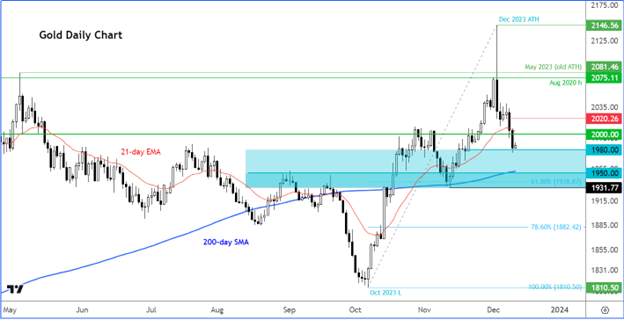Following Friday’s stronger US data, both gold and silver slumped to close the week sharply lower, even if the former had hit a new record high at the start of last week and the latter reached its best level since May, states Fawad Razaqzada of Trading Candles.
The metals broke down as the dollar and bond yields rebounded after a stronger jobs report and consumer sentiment data pushed back expectations for the Fed’s first rate cut. The focus is now turning to the upcoming release of US CPI today and the FOMC meeting on Wednesday.
Gold Analysis: Can the Metal Stage a Recovery?
Well, a lot depends on the CPI data, but it is also worth pointing out that the extent of the drop, some 7%, no less, from last Monday’s record high of $2146, means gold may have over-corrected, if the selling was indeed just driven by those stronger US data releases last week, or expectations thereof earlier in the week. A potential rebound should therefore not come as a major surprise this week, given that the prior trend was quite strong, meaning that a lot of would-be buyers who may have missed out, now have the opportunity to pick gold up at a 7% or so discount. What’s more, bond yields have started to retreat again, reducing the opportunity cost of holding gold, an asset that doesn’t pay any interest, unlike bonds.
Investors’ focus will be on at least two major events this week, the upcoming US CPI data today and the Fed’s rate decision on Wednesday. Following the strong consumer sentiment data and jobs figures for November, the market will be wondering whether they will hear any form of confirmation from the Fed that rate cuts could start at the end of Q1 or start of Q2 next year, after all. Perhaps, the upcoming CPI report could determine how hawkish or dovish the Fed will be on Wednesday. So, that’s where investors’ focus will be today.
All Eyes on US Inflation and FOMC Meeting
One of the focal points of the week on the economic calendar is going to revolve around today’s release of the November inflation report, potentially overshadowing the expected interest rate decision at the FOMC meeting the following day. If inflation doesn't exhibit signs of prompt easing, it could delay expectations for the Fed's initial rate reduction beyond Q1. Consumer prices resumed lower last month, coming in at 3.2% annual pace after remaining stagnant at 3.7% in the prior two months. This time, CPI is expected to ease down to 3.1% for November. Meanwhile, core CPI, which excludes volatile items such as food and energy, edged down to an over-two-year low of 4% in October from 4.1% in September. It is expected to remain unchanged in November.
The ongoing debate about whether the Fed will hint at cuts during Wednesday's FOMC meeting could well be determined by today’s CPI data. If we see more disinflationary signs, then it could trigger a significant market response, even if the Fed goes on to adopt a more cautious stance the following day.
Wednesday marks the final Federal Reserve meeting for 2023. The FOMC is set to unveil staff projections, dot plots, and the customary rate statement, and hold a subsequent press conference led by Chairman Jerome Powell. Fed Fund futures indicate an almost 100% likelihood of the Fed maintaining interest rates unchanged, but it is all about signals about a potential rate cut in the next few months that will be of interest to the market. Until last week, we saw a shift in expectations for the Fed's initial rate cut, moving from May to March. However, these expectations underwent some adjustments following robust jobs and consumer sentiment data on Friday.
Don’t Forget About BoE, ECB and SNB Meetings
Thursday is anticipated to see the three major central banks in Europe maintaining their existing policies. The Bank of England (BOE) has indicated its intention to keep the current rate unchanged for an extended period, while the European Central Bank (ECB) has recently halted its rate hikes, with market expectations ruling out the likelihood of another increase. Persistent weakness in economic data has led traders to anticipate an ECB rate cut next year, driving the DAX to attain a new record high in recent days, in what has been one of the strongest bullish trends. Similar to the Federal Reserve, a somewhat dovish stance from the ECB may be necessary to justify the market's reassessment for potential cuts. However, if the ECB does not signal such a move in the upcoming week, this could strengthen the euro and possibly hurt gold.
Gold Technical Analysis: Key Levels to Watch
Gold needed to hold $2000 to keep the bulls happy, but the fact this level gave way on Friday, we saw further follow-up technical selling on Monday, which saw gold spot price drop to as low as $1975. It has therefore arrived at the top of a major support zone in the range between $1950 to $1980, which is where it last staged a rally in November. The lower end of this support area is where we also have the 200-day average residing.
At this stage, a move back above $2000 is needed to signal the resumption of the bullish trend. The next reference point above this level is around $2020, the base of Friday’s breakdown.

Source: TradingView.com
To learn more about Fawad Razaqzada visit TradingCandles.com











